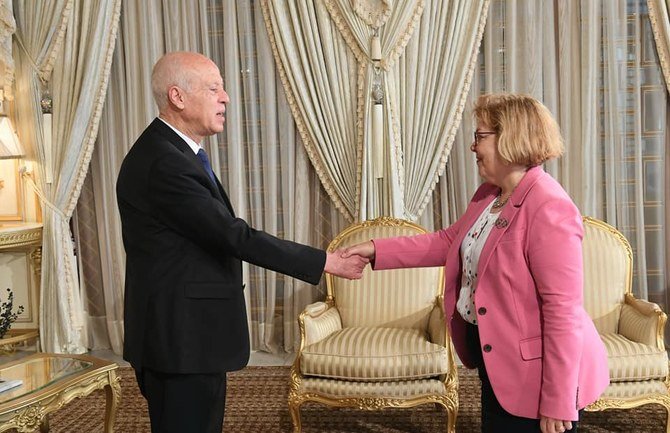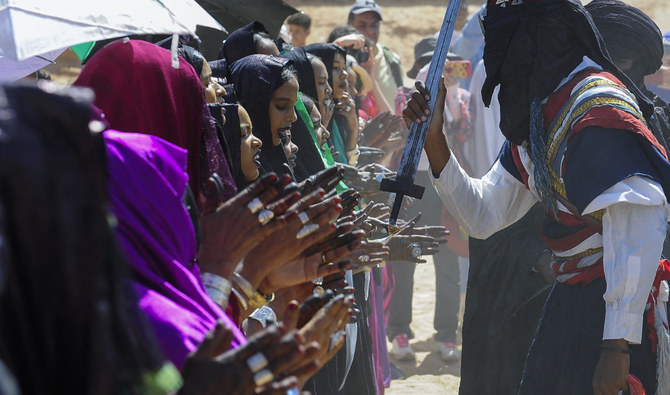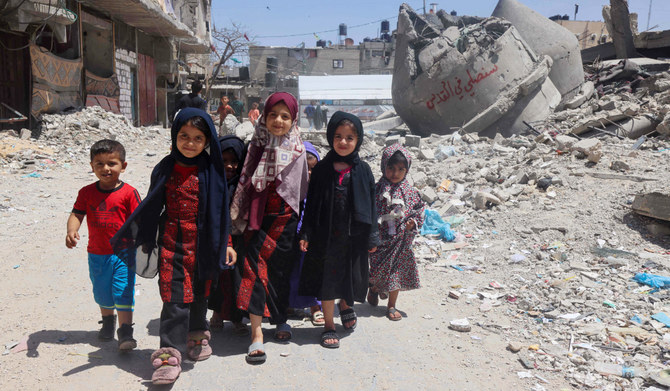Ali Younes
WASHINGTON: Barbara Leaf, the US assistant secretary of state for Near Eastern affairs, said on Wednesday that a main focus of her recent trip to several Arab countries was to reaffirm American engagement in the Middle East and North Africa.
She added that the aim was to reinforce the regional diplomacy efforts of President Joe Biden and his administration, including the sharing of US priorities, assistance for Washington’s regional partners to resolve conflicts, and a push for economic and political reforms.
Leaf said during a briefing in Washington, attended by the Arab News, that during her tour of Tunisia, Iraq, Jordan, Israel and the Palestinian West Bank in late August and early September she held talks with leading officials about the deescalation of conflicts and other local, regional and global issues.
In Tunisia, she said she discussed with President Kais Saied the political and economic challenges his country is facing. She stressed to him the US commitment to its partnership with Tunisia in support of democratic values and human rights, and the importance of an inclusive process for political and economic reforms.
Also in Tunisia, Leaf held talks with Mohammed Al-Menfi, chairman of the Presidential Council of Libya, and Saddek El-Kaber, governor of Libya’s Central Bank. She said she urged them to support a clear path to democratic national elections, along with economic reforms and transparency.
During her visits to Israel and the Occupied Palestinian Territories, Leaf said she reiterated Biden’s message during his own trip to the region in July that the “US remains unwavering in its ironclad commitment to Israel’s security and that the US will work … to strengthen the US-Israeli partnership.”
Washington also remains committed to “keeping alive the vision of a two-state solution where Palestinians and Israelis can live safely and securely and enjoy equal measures of freedom, security and prosperity,” she added. “This means working together collaboratively on economic and security issues and reducing unilateral action.”
Leaf said she also followed up on projects Biden has proposed with the aim of improving the Palestinian economic situation. These include Israeli permission for a 4G cellular service for Palestinians in the West Bank and Gaza, and an extension of the opening hours for the Allenby Bridge, which connects the Occupied Territories with Jordan and is the only option for international travel for three million Palestinians living in the West Bank.
In addition, Leaf discussed Biden’s proposal for $100 million in US aid to Palestinian hospitals in occupied East Jerusalem, which is awaiting approval by the US Congress.
It remains unclear, however, how the US will reconcile its vision for two-state solution amid ongoing illegal Israeli settlement activity in Palestinian areas, and Israeli military raids targeting Palestinians. Since its occupation of the Palestinian West Bank and Gaza in 1967, Israel has built numerous illegal settlements and is in control of Palestinian land, water resources and airwaves.
During her visit to Amman, Leaf met Ayman Safadi, Jordan’s deputy prime minister and foreign minister. She said they discussed bilateral relations and the upcoming signing of a seven-year memorandum of understating that will be largest and longest agreement between the two countries.
Jordan currently receives about $1.6 billion in annual economic and military aid from the US, which makes it the second-largest recipient after Israel.
“The US is committed to economic reform in Jordan while strengthening its resilience and stability and security,” Leaf said
She added that the human rights situation in the country, in particular the arrest of journalists and civil rights activists, forms part of continuing bilateral discussions.
Leaf said that in Iraq she met a number of senior officials, academics, civil society activists and entrepreneurs for discussions about the country’s stability, economic progress and political process.
The US considers Iraq a vital partner, she added, and a strategic framework agreement remains key to relations.
“All of our activities, programs and policies are framed to support Iraq’s sovereignty stability and security,” she said.






















